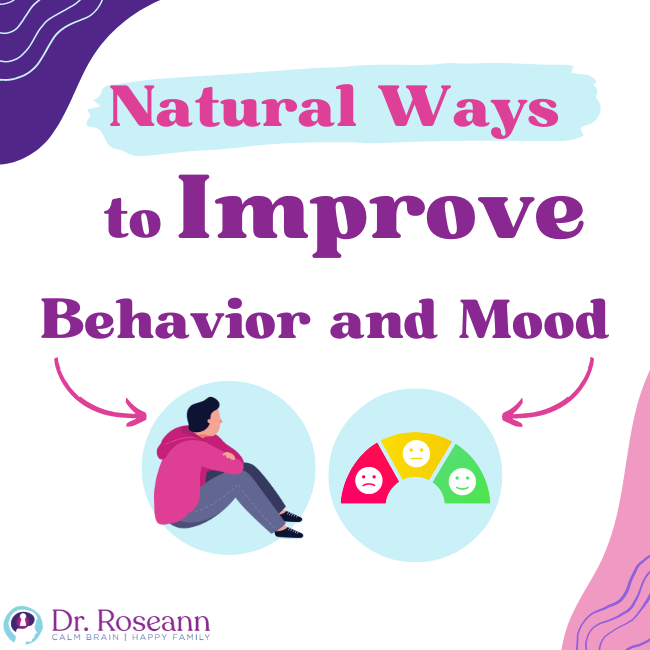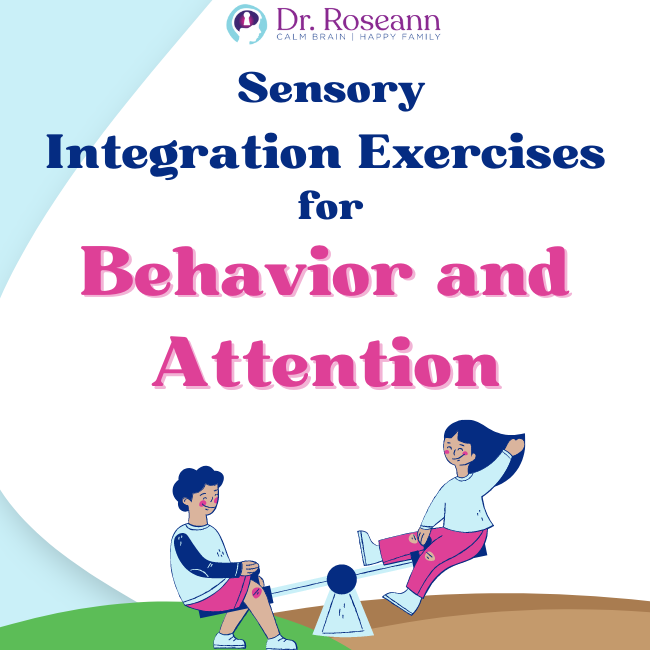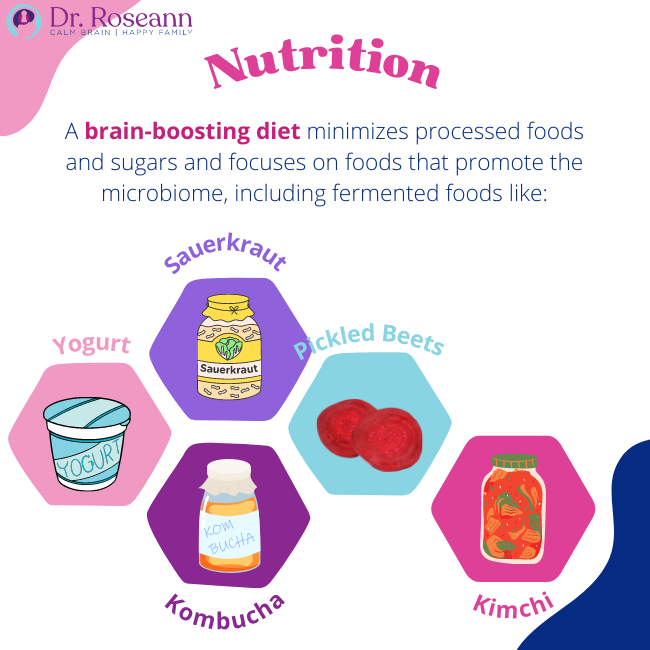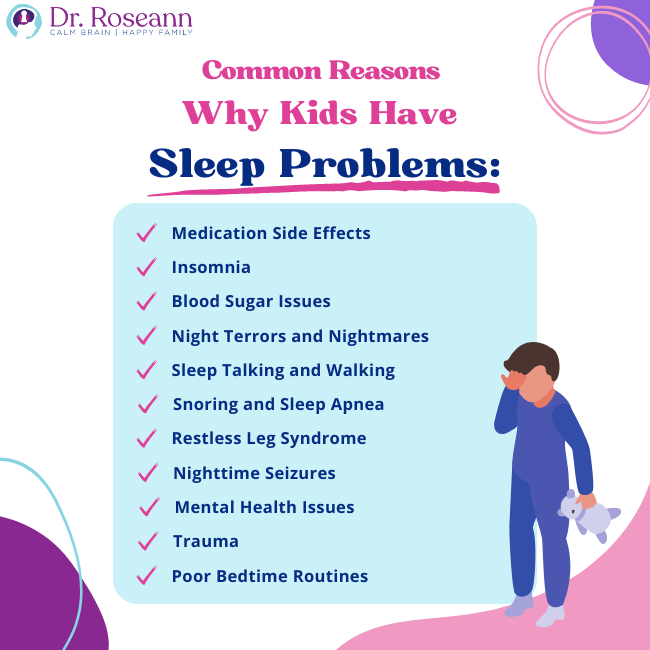Let’s face it. Kids have a lot on their plates today, and so do parents! Stress at school and home can build, and children of all ages may experience crankiness, lousy mood, and dysregulated behaviors. There are some practical tips that anyone can use to help regulate their child’s mood.
Every parent is worried about their child's behavior when young kids have behavioral problems, such as temper tantrums, emotional outbursts, or withdrawn behaviors. One may wonder about the source of their child’s “bad behavior” and how to help them improve positive behavior and feel good about themselves.
The good news is that every parent can encourage their kid’s behavioral self-regulation and cultivate desired behaviors at home and school. You are already teaching your child so much about how to function well in the world. The next level includes finding ways to get their brain to learn better and helping them find the best tools to reduce their stress and the friction at home.

Natural Ways to Improve Your Child’s Behavior
Improving behavior and mood naturally involves adopting various lifestyle changes and incorporating habits that promote mental and emotional well-being. Here are some effective behavior management strategies:
1. Exercise to Promote Positive Behaviors
We know through research that getting kids moving is a great way to improve how their brain alerts and how they remember things and take action. Kids who do regular exercise perform better in school and show fewer ADHD symptoms.
In a meta-analysis of 30 studies that looked at short-term and long-term studies supporting the clinical benefits of physical activity for individuals with Attention Deficit Hyperactivity Disorder, Ng et. al (2017) found, “Physical activity, in particular moderate-to-intense aerobic exercise, is a beneficial and well-tolerated intervention for children and adolescents with ADHD.”
Kids with ADHD benefited so much from moderate-to-intense aerobic exercise that the cognitive, behavioral, and physical symptoms of ADHD were alleviated in most instances. The kids with the greatest symptom relief participated in mixed exercise programs, likely providing an extra stimulation benefit.
Exercise has many neurological and physical benefits on the brain and behavior, but ultimately, it improves neurotransmitter function and calms sensory needs. These benefits lead to a calm brain, regulated behavior, and better mental health.
Spend quality time with your kids doing outdoor activities you both love. Doing so fosters a strong bond between you and your child and provides opportunities for them. It also makes children learn valuable skills and develop a deeper appreciation for nature. You can go hiking, biking, or playing at the park. This one-on-one time creates lasting memories and strengthens your connection with your child while promoting positive behaviors.
2. Physical Activities Help Sensory Needs
Some children can be either hypersensitive or hypersensitive to sensory input, which leads to bad behavior. A child seeking sensory input may pull furniture or get very close to people because they are under-sensitive (or hypersensitive) to touch and seek sensory output.
Sensory needs include areas relating to the five senses: taste, touch, smell, sight, and sound. Additionally, there are sensory needs relating to motion and balance, known as our proprioceptive and vestibular senses. When one experiences sensory sensitivity, they have difficulty modulating information from the senses, resulting in some responsive behavioral output.
Sensory issues can cause your child distress when exposed to too much or too little stimuli. Hypersensitivity can cause some children to react to loud sounds by putting their fingers in their ears. It may also lead to a behavioral outburst, for instance, when clothes don’t feel right.
Many other specific behaviors are associated with sensory needs. However, hyper or hypo-sensory responses are sometimes not so apparent to you or your child. The best person to advise on sensory needs would be an Occupational Therapist (OT). An occupational therapist can help them handle their visual, tactile, balance, motion, and auditory needs.
Managing these sensory needs positively impacts regulating children’s behavior, attention, and mood. Sensory exercises at home or with an OT help children regulate their input so they aren’t so affected by what should be benign information.

Sensory Integration Exercises for Behavior and Attention
Sensory integration exercises help children with SPD, attentional, or behavioral issues interact more successfully with their environments by making activities fun and gradually introducing inputs.
- Playing with mud, clay/dough, sand, water, or bubbles enhances tactile processing. Kneading bread dough is a fun and challenging activity.
- Lifting heavy objects. Children with proprioceptive challenges may benefit from heavy work activities, including lifting grocery bags, moving chairs, stacking books, and digging and raking in the garden.
- Expanding their visual vocabulary by introducing different colors through new toys and clothes.
- Balancing activities and jumping reduce vestibular dysfunction. Indoor or outdoor trampolines, ride-on or rocking toys, swings, and seesaws are all fun and helpful activities.
- Reducing visual sensitivity with light exposures. Different types of lighting can have different effects on kids. Lava lamps, for example, can help them adjust to intermittent light. On the other hand, dim switches let parents dim or brighten the lights in a room.
- Diffusing essential oils. Aromatherapy can help with olfactory sensitivity. Older children can be given a small bottle of essential oil, like peppermint, to cover unpleasant smells.
- Tasting games with fruit or other foods can be enjoyable for younger kids, who often like guessing the flavors. Encouraging children to help prepare food can introduce them to new tastes and textures. Serving food on a plate and playing games with it may encourage children to sample it.
Parents can boost youngsters' intellectual, social, and emotional development and help them improve low self-esteem by assisting them with sensory integration exercises.
3. Balance Blood Sugar and Insulin Levels
Dietary intervention can go a long way in fostering better behavior. Types of diets such as Paleo, GAPS, anti-inflammatory, and intermittent fasting have benefits such as regulating blood sugar and insulin, which helps prevent conditions like type 2 diabetes and improve emotional health.
High blood sugar or unregulated insulin levels can affect cognition, mood, attention, memory, and stress. When your blood sugar is high, your behavior is affected. As a result, you may need help with motivation, agitation, and thinking. Getting through the school day, finishing homework, or remembering to bring down your laundry will be much more complicated.
Adding foods higher in nutrients and swapping out foods for healthier alternatives is a great starting point to help regulate blood sugar and insulin levels.
I recommend that families start gradually by swapping out healthier versions of foods already enjoyed and adding more healthy fats. We all want to dive in or not do it at all, but a gradual approach is best for kids and families.
4. Build Resilience through Positive Feedback
Fostering resilience in children requires positive feedback and opportunities for growth. Rather than expecting perfection, allowing kids to make mistakes builds their coping skills and problem-solving abilities.
Encouraging age-appropriate decision-making and respecting their preferences nurtures self-confidence and independence. These experiences cultivate grit, resilience, and better social relationships in children.
During challenging times, guide children with encouragement and a focus on independent problem-solving. Being a role model by demonstrating effective stress management and balance in life sets a powerful example for children.
Integrating problem-solving skills into everyday life activities like music, art, and puzzles sparks curiosity and builds diverse skills. Promoting positive school behavior also involves acknowledging and reinforcing participation, collaboration, and respectful interactions with peers and teachers.
Social development plays a crucial role in teaching children how to navigate life. Encouraging solid friendships and providing guidance without overbearing supervision fosters independence and social skills.
Establishing clear expectations for better behavior helps children understand boundaries and develop a healthy balance of responsibility and freedom. Allowing them to explore the world and experience natural consequences encourages growth.
Implementing a reward system where children earn privileges for their efforts reinforces positive behavior. Spending quality time with children without hovering fosters a sense of being seen and heard, strengthening the parent-child bond and promoting open communication.
5. Explore the Secrets of the Gut-Brain Connection
Healthy gut, happy brain! There is a connection between our gut and brain, and it is connected through the vagus nerve. Not many parents know that gut health is also a part of effective behavior management strategies for promoting positive behaviors.
The gut microbiome is essential for good mental health, as it helps produce vital neurotransmitters like serotonin and dopamine that are associated with feelings of joy and satisfaction and are beneficial to your mental health.
So, exploring ways to maintain a healthy and happy microbiome through supplementation and a healthy diet is essential for better behavior and mental health and should be a priority for all parents of kids with behavioral issues.
Diets such as intermittent fasting, Paleo, GAPS, etc., enhance your mental health by improving digestion, balancing hormones, and increasing the gut microbiota levels that keep anxiety and depression at bay. The prescribed foods in these diets contain nutrients that can contribute to healthy gut flora.
Maintaining a healthy, anti-inflammatory, nutrient-dense diet is best for a healthy brain and gut. Sugary and unhealthy food dysregulates blood sugar and spikes insulin levels, affecting mood swings, memory, stress, and attention.
Optimal connections between the gut and the brain boost overall mood. Dr. Roseann’s BrainBraviorReset Program™ considers family and children’s diet a vital mental health component, so we show parents how to weave healthier foods into the family diet.
6. Nutrition
Food fuels the brain. That is precisely why loading your system with the proper fuel unleashes the best version of yourself. Ensuring a balanced diet rich in nutrients supports physical health. It enhances cognitive function, mood stability, and overall mental well-being, allowing us to perform optimally in various aspects of life.
Eating the right food enhances your mood and emotional balance, so it must be prioritized when addressing behavior and mental health. On the flip side, a diet high in sugar impairs the brain and triggers symptoms of depression, decreases motivation, and makes it harder to listen and focus.

We can all relate to the post-indulgence food coma! The same happens to your child with breakfast cereal, muffins, or pizza. These are brain-drain foods.
The right foods can increase beneficial brain chemicals. Serotonin is a neurotransmitter that encourages a wealth of essential bodily functions, including fostering restful sleep, a hearty appetite, and a positive mood while easing pain sensations. Your food intake influences the production of serotonin, 95% of which is produced in the intestinal tract.
A brain-boosting diet minimizes processed foods and sugars and focuses on foods that promote the microbiome, including fermented foods like sauerkraut, yogurt, pickled beets, kombucha, and kimchi. Kids can participate in choosing or making these, which makes them more likely to eat them.
Half of your plate should be fresh fruits and vegetables. The remaining half should contain unprocessed grains, fish, seafood, meats, and healthy fats. Most kids with behavioral issues are especially deficient in healthy fats and protein, so prioritizing these in their meals can promote better behavior.
7. Deep Sleep
Kids with behavioral issues rarely get enough restful or deep sleep. Some kids have trouble sleeping, and others wake up a lot. Some people have physical or mental health issues that impair sleep.
The question becomes, why do so many kids with behavioral issues have trouble sleeping?
There are many reasons kids with behavioral problems have sleep issues, and looking at why your child is struggling with getting enough sleep is essential.

Common reasons why kids have sleep problems:
- Insomnia
- Blood Sugar Issues
- Night Terrors and Nightmares
- Sleep Talking and Walking
- Snoring and Sleep Apnea
- Restless Leg Syndrome
- Nighttime Seizures
- Mental Health Issues
- Trauma
- Poor Bedtime Routines
Understanding why your child isn’t sleeping is essential to addressing their behavior. Sleep is a foundational component of mental health, and without good sleep, the brain can’t detoxify, focus, learn, and regulate mood.
8. Use Supplements to Regulate Behavior
We are all so busy these days, especially transitioning from summer to fall. This probably means we aren’t getting enough sit-down meals and may even have to settle for grabbing bagels or chips on the go. Then you feel guilty… Ugh! Trust me, you aren’t alone in this!
The problem is that your kid isn’t getting enough nutrients to support optimal brain and body function. This can lead to low energy levels, brain fog, or even feelings of sadness, anger, or anxiety that you can’t otherwise explain. When you don’t eat right, it shows up in your unwanted behaviors.
Your diet directly impacts your brain and gut health, affecting your mental well-being. Not getting enough nutrients can lead to problems like tantrums, emotional outbursts, and low motivation. As your body may be missing specific vitamins, consider taking supplements associated with improved focus and behavior.
Fortunately, adding essential nutrients to your diet can help combat these issues by adding antioxidants that support a healthy nervous system. So, to improve your mental health, ensure you eat plenty of nutrient-rich foods or add supplements that fill in the gaps.
Nutrients are essential in keeping the nervous and circulatory systems functioning correctly. Nutrient deficiency can strain organs and increase the risk for chronic diseases, behavioral disorders, and mental health conditions such as anxiety, depression, and OCD.
Supplements for Better Behavior:
- Folate is essential for producing red blood cells, which are necessary for proper brain and body function and detoxification.
- Potassium promotes heart, nerve, and muscle function and helps to deliver essential nutrients to cells while removing waste products. Low levels of potassium can lead to mental health problems such as brain fog, memory loss, mood swings, depression, psychosis, and confusion.
- Calcium – Calcium helps transmit signals between nerve cells, promoting a calming effect on the nervous system. Low calcium levels have been linked to depression and stress. Calcium works well with magnesium, vitamin D, and potassium to support overall health.
- Dietary fiber is essential for maintaining a healthy gut and promoting mental health. The gut-brain connection is well-established; a healthy gut is necessary to produce neurotransmitters like serotonin.
- Vitamin D – Vitamin D receptors are found in every body tissue, including the brain, heart, muscles, and the endocrine and immune systems. Having adequate vitamin D levels is necessary for mood, anxiety, and immune function.
- Vitamin B12 is one of the essential B vitamins that helps the body to produce energy and fight off diseases. Low levels of B12 can make one feel unfocused, tired, mentally tired, or have brain fog, and it can interfere with mood and managing stress.
- Vitamin C is essential for boosting immunity and maintaining healthy brain function. It helps neurotransmitters communicate and aids in developing and maintaining neural connections.
- Magnesium involves over 300 bodily processes, including regulating the stress response, supporting the nervous system and metabolism, and synthesizing antioxidants like glutathione.
9. Create Joyful Moments
Daily life can be busy and stressful, and parenting a special needs child can be even more stressful. It’s easy to get caught up, be busy, and forget to laugh. It is essential to slow down and have those special fun moments.
Laughter and silliness can greatly defuse tense situations and moody or cranky kids. When our youngest gets grumpy in my house, I always say, “Is that the Hulk coming out? Where is Bruce Banner?” Smiles and laughter always stop him in his tracks!
Making sure to stop and have fun has to be a priority at home. That means stopping and dancing, telling jokes, and just being silly.
Stress is a constant in every home and must be countered— laughter is the best medicine. It helps kids reduce stress naturally, identify when natural stressors are present, and learn to manage whatever comes their way.
10. Look At Why A Behavior is Happening
Kids will seek out attention in any way they can. When families accidentally give their child negative attention, that is, paying the most attention when a child misbehaves, it will likely happen again. It is not helpful to think they are acting like this on purpose. You all are just stuck…behaviorally.
Instead of feeling upset about your child’s behavior, flip that script and think about what could improve your kid’s behavior. That means pulling back and looking at why the behavior is happening.
When a child has behavioral issues or misbehaves, the child doesn't know what to do, and parents usually say things like, “Stop touching your sister” or “Knock it off.” It is more helpful to show your child what they should do.
Think about what they need for that “good behavior” you all want to see displayed. Are they missing coping skills or an understanding of the task? Do they need more practice?
When you take a closer look at why, I promise you, you will be surprised at what you find that your child needs to be behaviorally successful.
While this isn’t a substitute for professional one-to-one support from a therapist, many parents have uncovered a lot about their child’s behavior when they take the time to dig deeper. The next step is providing explicit guidance and positive reinforcement to increase learning.
There are many neurological and physical benefits to how you can naturally improve your kid’s behavior, but ultimately, these behavior management strategies improve neurotransmitter function and calm sensory needs. These benefits lead to a calm brain, regulated behavior, and better mental health.
For more tips to improve your child’s behavior, get instant access to effective strategies that work. Download the 147 Therapist-Endorsed Self-Regulation Strategies for Children for free!
What do you mean by child positive attention?
Positive attention for a child refers to recognizing, praising, and encouraging good behaviors that align with desired values or expectations. It involves actively noticing and acknowledging the child's efforts, accomplishments, and positive attributes, which helps reinforce and strengthen their low self-esteem and sense of worth.
What's the most effective way to promote the very behavior you want to see in your child?
The most effective way to promote the correct behavior you want to see in your child is through positive reinforcement. This involves consistently acknowledging and rewarding desired behaviors with praise, attention, or privileges, which helps reinforce those behaviors and encourages their repetition. Additionally, leading by example and modeling the behavior you want to see can have a powerful impact on your child's actions and attitudes.
How do defined routines improve behavior?
Defined routines provide structure and predictability, which can help children feel secure and understand what is expected of them. Consistent routines also teach time management skills and promote self-discipline. Dealing with bad behavior in children starts with teaching them how to learn, anticipate, and adapt to daily expectations.
What are non-verbal cues, and how do you use them to promote good behavior?
Nonverbal cues encompass facial expressions, body language, gestures, and tone of voice. By using positive body language, such as eye contact, smiles, nods, encouraging gestures, and a calm tone of voice, parents can reinforce desired behaviors, establish clear communication, and create a supportive environment conducive to promoting good behavior in children.
How can students learn good behavior in the fastest way?
Training students to learn good behavior starts with consistent modeling and reinforcement. Notice how observing positive behavior demonstrated by teachers and peers and receiving immediate and consistent feedback on their actions allows students to understand expectations and adapt their behavior quickly.
What are practical consequences that can promote good behavior?
Effective consequences for promoting good behavior include positive reinforcement, such as praise, rewards, or privileges, for demonstrating desired behaviors. Additionally, logical consequences directly related to the behavior, such as loss of privileges or additional responsibilities, can reinforce the importance of making positive choices. Consistency and clarity in applying consequences are critical to their effectiveness.
Do strong emotions affect behavior?
Yes, strong emotions can significantly impact behavior. When experiencing intense emotions such as anger, fear, or excitement, individuals may exhibit impulsive or irrational actions influenced by their emotional state. Understanding and managing these emotions effectively is crucial for maintaining appropriate behavior and making sound decisions.
How does feeling overwhelmed relate to bad behaviors?
Feeling overwhelmed can lead to bad behaviors, often triggering stress responses that impair cognitive function and decision-making abilities. When overwhelmed, individuals may struggle to cope with emotions effectively. They may use impulsive or maladaptive behaviors to manage or escape from overwhelming feelings. Additionally, feeling overwhelmed can result in a decreased ability to regulate emotions, leading to outbursts, irritability, or withdrawal.
How can adults point out bad behavior to kids or students without raising their voices?
Adults can effectively address bad behavior in kids and students without raising their voices by using calm and assertive communication. Course a firm but respectful tone and state expectations and consequences. Active listening, empathy, and problem-solving approaches can also help foster understanding and cooperation while maintaining a positive and supportive relationship.
How does being involved in the moment allow kids to behave better?
Being involved in the moment allows kids to behave better by promoting mindfulness and awareness of their actions and surroundings. Children are less likely to be distracted or impulsive when fully engaged in their actions, leading to better self-regulation and decision-making. Additionally, being present allows adults to provide timely guidance and support, reinforcing positive behaviors and addressing challenges.
How do you catch and correct wrong behavior in education or classroom settings?
Catching and correcting wrong behavior involves immediate observation and intervention in education or classroom settings. Address the behavior calmly but assertively, clearly communicating expectations and consequences. Providing consistent feedback, reinforcement of positive behaviors, and offering guidance on appropriate alternatives are essential to effectively managing and correcting bad behavior.
How does journal writing help in behavioral improvement?
Journal writing can aid in behavioral improvement by promoting self-reflection and introspection. Through writing about their thoughts, feelings, and experiences, individuals gain insight into their behavior patterns, triggers, and underlying emotions, allowing them to identify areas for improvement and develop strategies for positive change. Additionally, journaling is a tool for tracking progress and monitoring behavioral changes over time.
When should parents finally decide to address improper behavior in their kids professionally?
Parents should consider addressing improper behavior in their kids professionally when it persists despite consistent and appropriate interventions at home or when the behavior significantly impacts the child's functioning in various settings such as school, social interactions, or daily activities.
Citations:
Harvard Health Publishing (2019), More evidence that Exercise can boost mood
https://www.health.harvard.edu/mind-and-mood/more-evidence-that-exercise-can-boost-mood
Ng, Q. X., Ho, C., Chan, H. W., Yong, B., & Yeo, W. S. (2017). Managing childhood and adolescent attention-deficit/hyperactivity disorder (ADHD) with exercise: A systematic review. Complementary therapies in medicine, 34, 123–128. https://doi.org/10.1016/j.ctim.2017.08.018
Sleep Foundation (2022), Healthy Sleep Tips https://www.sleepfoundation.org/sleep-hygiene/healthy-sleep-tips
Dr. Roseann is a mental health expert in Self-Regulation who is frequently in the media:
- Healthline Understanding Self-Regulation Skills
- Scary Mommy What Is Self-Regulation In Children, And How Can You Help Improve It?
- The Warrior Parent Podcast It's Gonna Be OK! Changing Behaviors and Responses (And The Magic of Magnesium)In Your Family with Dr. Roseann Capanna-Hodge
Always remember… “Calm Brain, Happy Family™”
Disclaimer: This article is not intended to give health advice and it is recommended to consult with a physician before beginning any new wellness regime. *The effectiveness of diagnosis and treatment vary by patient and condition. Dr. Roseann Capanna-Hodge, LLC does not guarantee certain results.
Are you looking for SOLUTIONS for your struggling child or teen?
Dr. Roseann and her team are all about science-backed solutions, so you are in the right place!
Grab your complimentary copy of
147 Therapist-Endorsed Self-Regulation Strategies for Children: A Practical Guide for Parents
Dr. Roseann is a Children’s Mental Health Expert and Licensed Therapist who has been featured in/on hundreds of media outlets including The Mel Robbins Show, CBS, NBC, PIX11 NYC, Today, FORBES, CNN, The New York Times, The Washington Post, Business Insider, Women’s Day, Healthline, CNET, Parade Magazine and PARENTS. FORBES called her, “A thought leader in children’s mental health.”

She coined the terms, “Re-entry panic syndrome” and “eco-anxiety” and is a frequent contributor to media on mental health.
Dr. Roseann Capanna-Hodge has three decades of experience in working with children, teens and their families with attention-deficit hyperactivity disorder (ADHD), autism, concussion, dyslexia and learning disability, anxiety, Obsessive Compulsive Disorder (OCD), depression and mood disorder, Lyme Disease, and PANS/PANDAS using science-backed natural mental health solutions such as supplements, magnesium, nutrition, QEEG Brain maps, neurofeedback, PEMF, psychotherapy and other non-medication approaches.
She is the author of three bestselling books, It’s Gonna Be OK!: Proven Ways to Improve Your Child's Mental Health, The Teletherapy Toolkit, and Brain Under Attack. Dr. Roseann is known for offering a message of hope through science-endorsed methods that promote a calm brain.
Her trademarked BrainBehaviorResetⓇ Program and It’s Gonna be OK!Ⓡ Podcast has been a cornerstone for thousands of parents facing mental health, behavioral or neurodevelopmental challenges.
She is the founder and director of The Global Institute of Children’s Mental Health, Neurotastic™Brain Formulas and Dr. Roseann Capanna-Hodge, LLC. Dr. Roseann is a Board Certified Neurofeedback (BCN) Practitioner, a Board Member of the Northeast Region Biofeedback Society (NRBS), Certified Integrative Mental Health Professional (CIMHP) and an Amen Clinic Certified Brain Health Coach. She is also a member of The International Lyme Disease and Associated Disease Society (ILADS), The American Psychological Association (APA), Anxiety and Depression Association of America (ADAA) National Association of School Psychologists (NASP), International OCD Foundation (IOCDF).
© Roseann-Capanna-Hodge, LLC 2024
Disclaimer: This article is not intended to give health advice and it is recommended to consult with a physician before beginning any new wellness regime. *The effectiveness of diagnosis and treatment vary by patient and condition. Dr. Roseann Capanna-Hodge, LLC does not guarantee certain results.










